【弯道超车】Unit 2 We're Family! 核心语法之过去完成时-2025年鲁教版(五四学制)(2024)新六年级英语上册精讲精练 (含答案解析)
文档属性
| 名称 | 【弯道超车】Unit 2 We're Family! 核心语法之过去完成时-2025年鲁教版(五四学制)(2024)新六年级英语上册精讲精练 (含答案解析) | 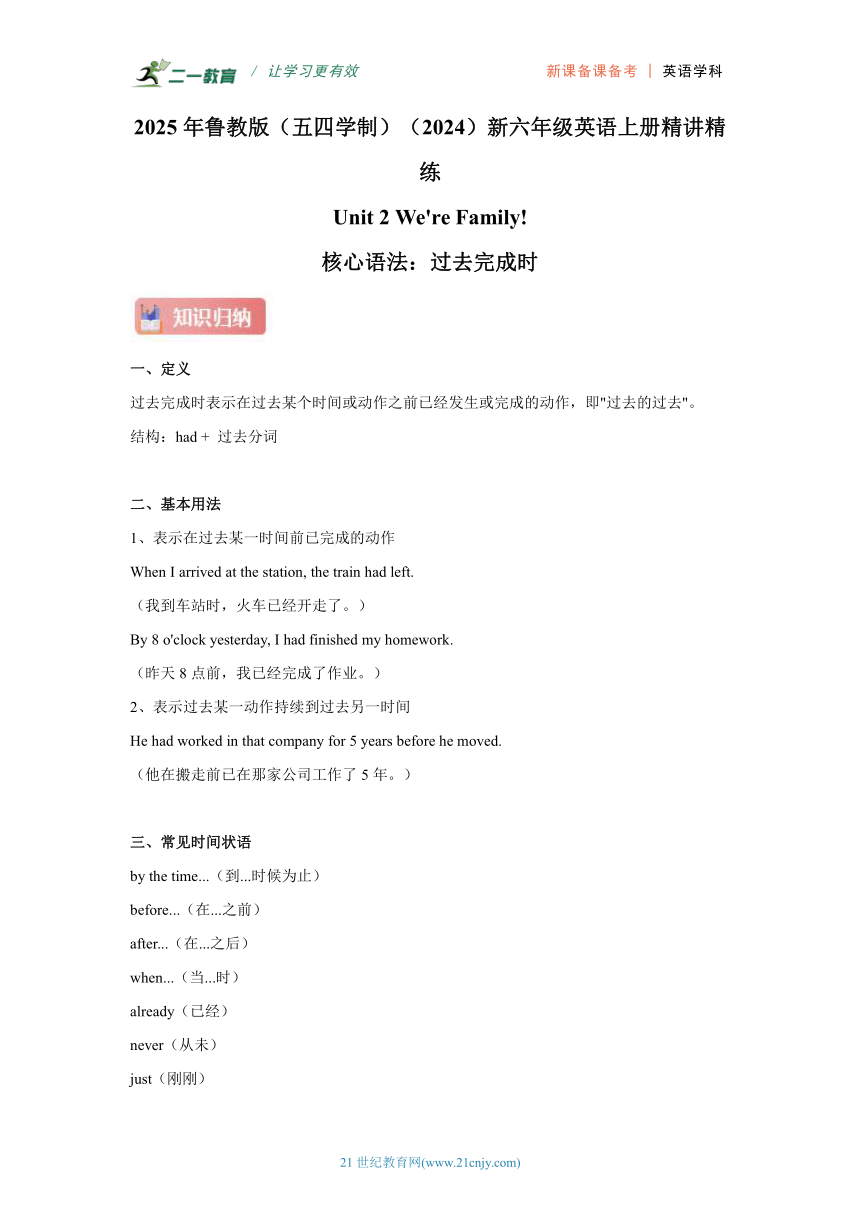 | |
| 格式 | docx | ||
| 文件大小 | 66.8KB | ||
| 资源类型 | 试卷 | ||
| 版本资源 | 鲁教版 | ||
| 科目 | 英语 | ||
| 更新时间 | 2025-07-09 08:59:58 | ||
图片预览

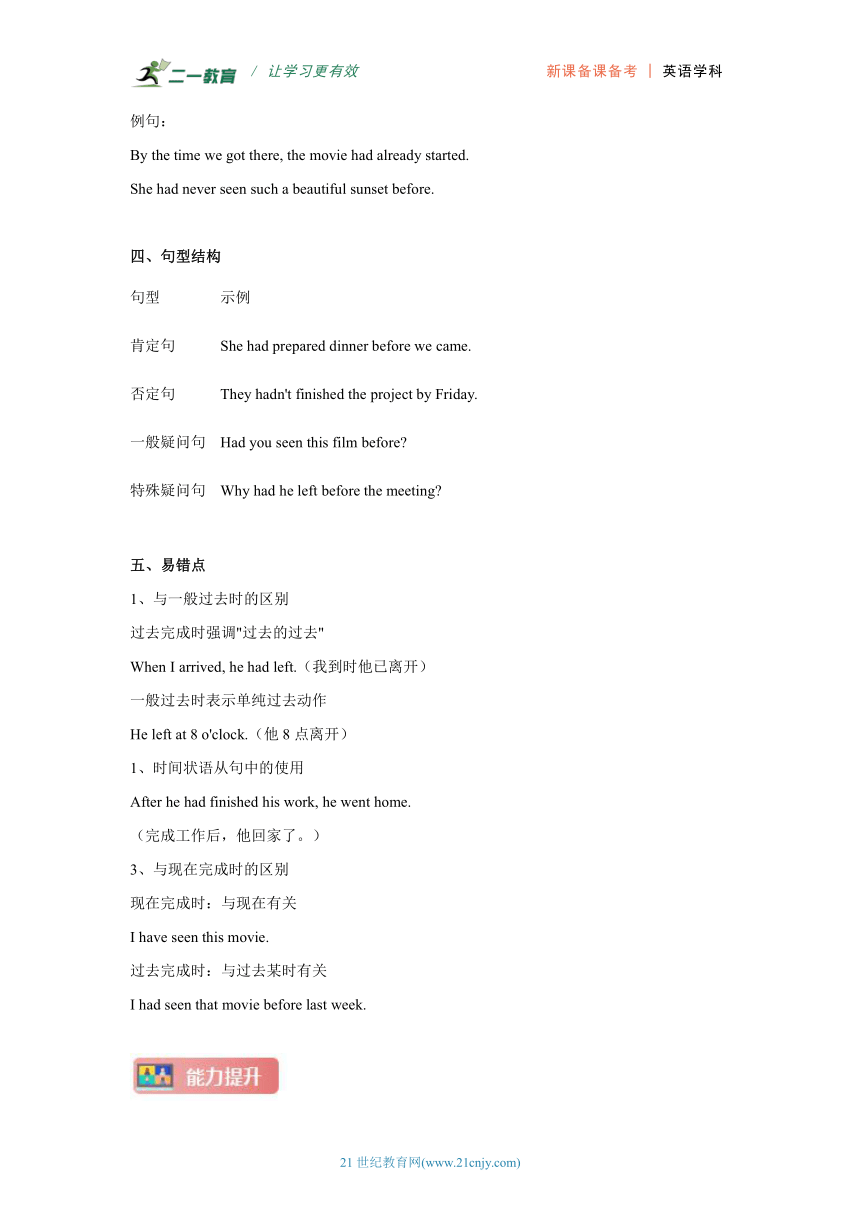
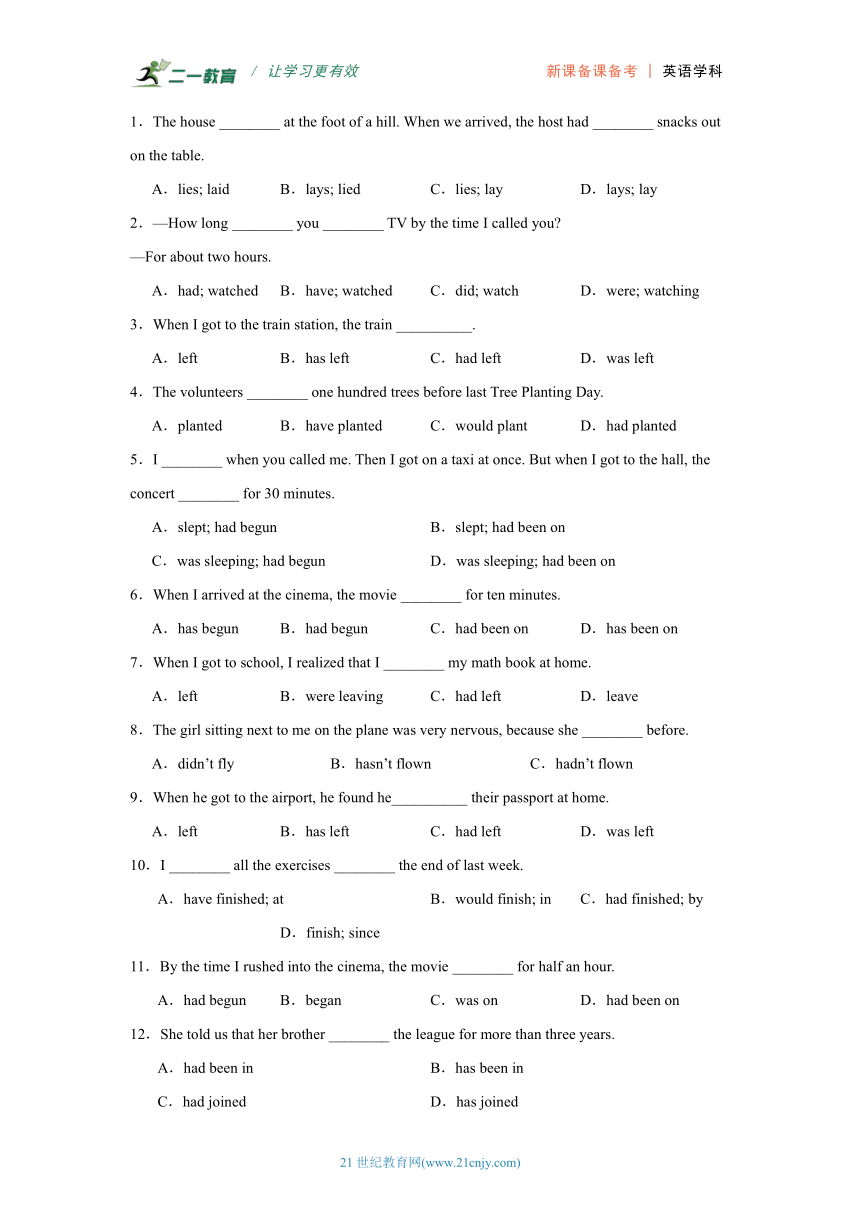
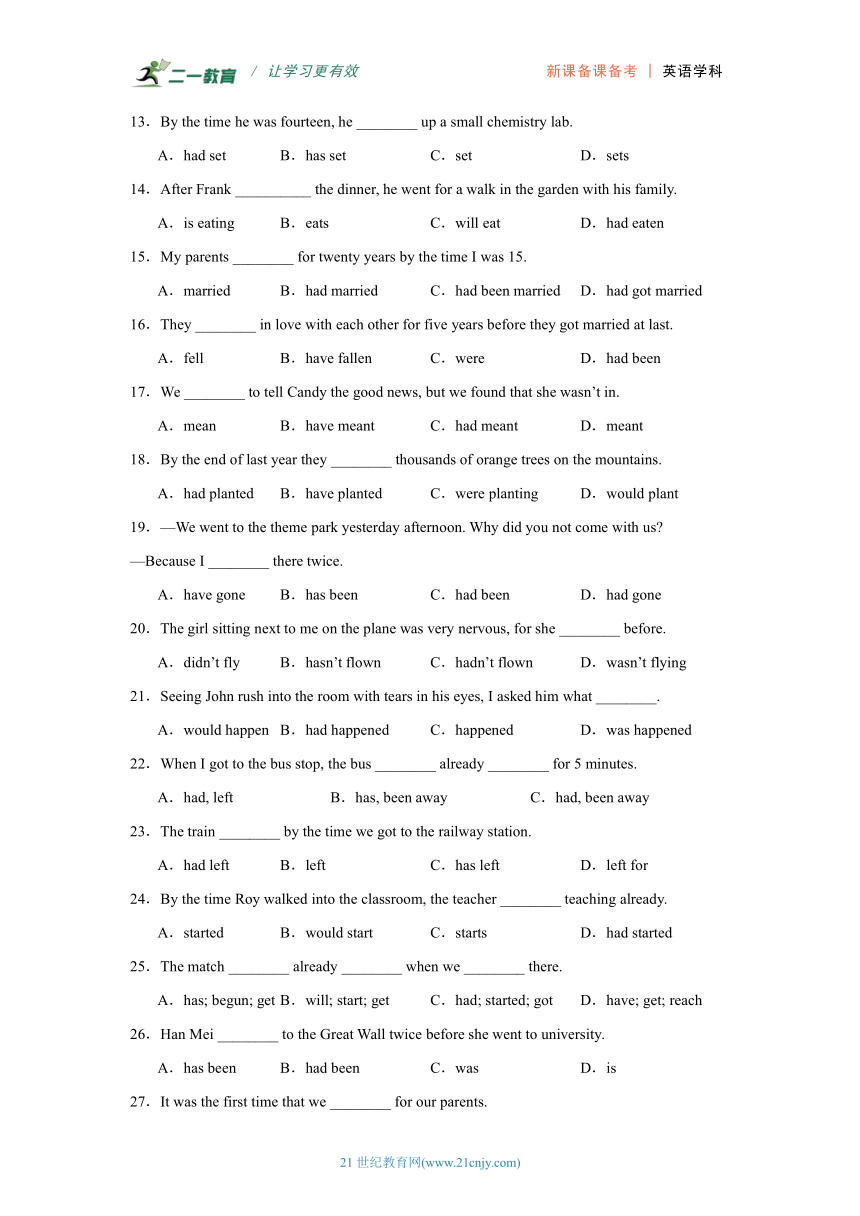
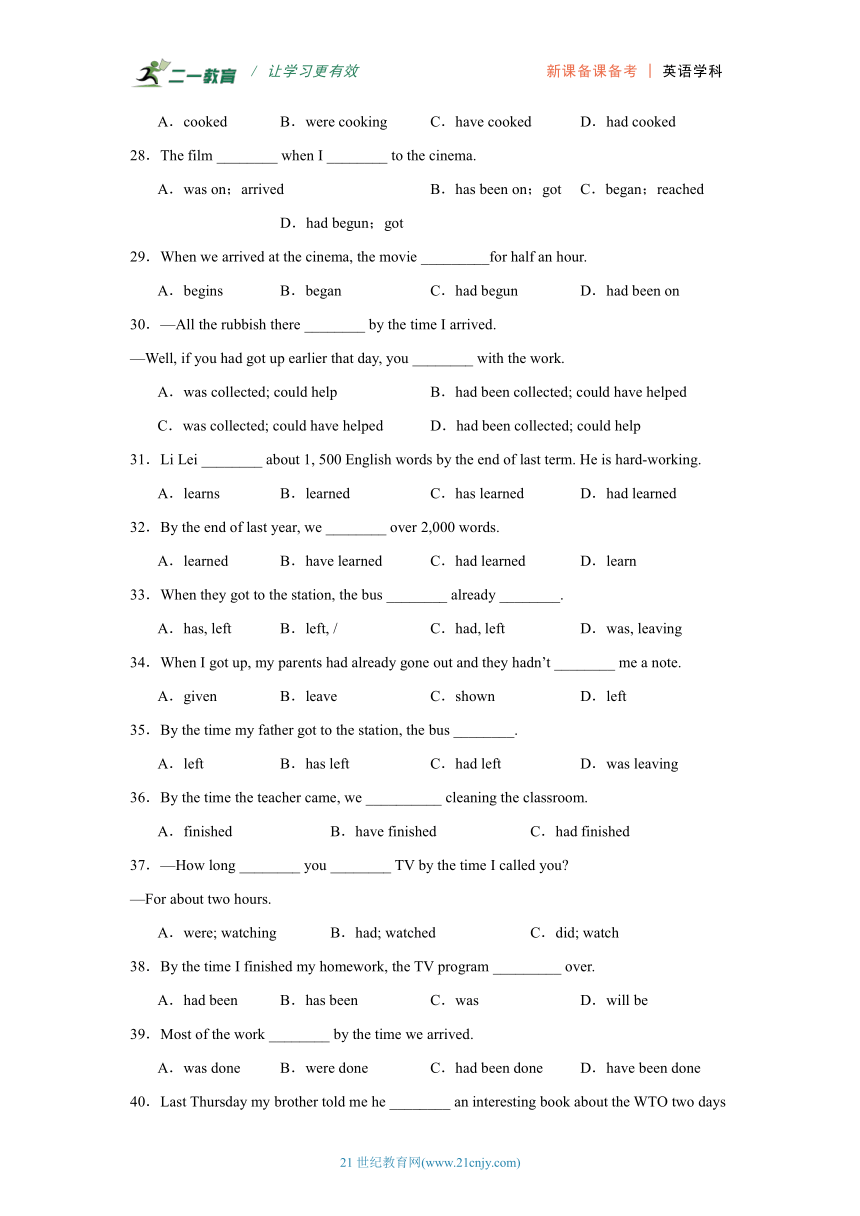
文档简介
/ 让学习更有效 新课备课备考 | 英语学科
/ 让学习更有效 新课备课备考 | 英语学科
2025年鲁教版(五四学制)(2024)新六年级英语上册精讲精练
Unit 2 We're Family!
核心语法:过去完成时
一、定义
过去完成时表示在过去某个时间或动作之前已经发生或完成的动作,即"过去的过去"。
结构:had + 过去分词
二、基本用法
1、表示在过去某一时间前已完成的动作
When I arrived at the station, the train had left.
(我到车站时,火车已经开走了。)
By 8 o'clock yesterday, I had finished my homework.
(昨天8点前,我已经完成了作业。)
2、表示过去某一动作持续到过去另一时间
He had worked in that company for 5 years before he moved.
(他在搬走前已在那家公司工作了5年。)
三、常见时间状语
by the time...(到...时候为止)
before...(在...之前)
after...(在...之后)
when...(当...时)
already(已经)
never(从未)
just(刚刚)
例句:
By the time we got there, the movie had already started.
She had never seen such a beautiful sunset before.
四、句型结构
句型 示例
肯定句 She had prepared dinner before we came.
否定句 They hadn't finished the project by Friday.
一般疑问句 Had you seen this film before
特殊疑问句 Why had he left before the meeting
五、易错点
1、与一般过去时的区别
过去完成时强调"过去的过去"
When I arrived, he had left.(我到时他已离开)
一般过去时表示单纯过去动作
He left at 8 o'clock.(他8点离开)
1、时间状语从句中的使用
After he had finished his work, he went home.
(完成工作后,他回家了。)
3、与现在完成时的区别
现在完成时:与现在有关
I have seen this movie.
过去完成时:与过去某时有关
I had seen that movie before last week.
1.The house ________ at the foot of a hill. When we arrived, the host had ________ snacks out on the table.
A.lies; laid B.lays; lied C.lies; lay D.lays; lay
2.—How long ________ you ________ TV by the time I called you
—For about two hours.
A.had; watched B.have; watched C.did; watch D.were; watching
3.When I got to the train station, the train __________.
A.left B.has left C.had left D.was left
4.The volunteers ________ one hundred trees before last Tree Planting Day.
A.planted B.have planted C.would plant D.had planted
5.I ________ when you called me. Then I got on a taxi at once. But when I got to the hall, the concert ________ for 30 minutes.
A.slept; had begun B.slept; had been on
C.was sleeping; had begun D.was sleeping; had been on
6.When I arrived at the cinema, the movie ________ for ten minutes.
A.has begun B.had begun C.had been on D.has been on
7.When I got to school, I realized that I ________ my math book at home.
A.left B.were leaving C.had left D.leave
8.The girl sitting next to me on the plane was very nervous, because she ________ before.
A.didn’t fly B.hasn’t flown C.hadn’t flown
9.When he got to the airport, he found he__________ their passport at home.
A.left B.has left C.had left D.was left
10.I ________ all the exercises ________ the end of last week.
A.have finished; at B.would finish; in C.had finished; by D.finish; since
11.By the time I rushed into the cinema, the movie ________ for half an hour.
A.had begun B.began C.was on D.had been on
12.She told us that her brother ________ the league for more than three years.
A.had been in B.has been in
C.had joined D.has joined
13.By the time he was fourteen, he ________ up a small chemistry lab.
A.had set B.has set C.set D.sets
14.After Frank __________ the dinner, he went for a walk in the garden with his family.
A.is eating B.eats C.will eat D.had eaten
15.My parents ________ for twenty years by the time I was 15.
A.married B.had married C.had been married D.had got married
16.They ________ in love with each other for five years before they got married at last.
A.fell B.have fallen C.were D.had been
17.We ________ to tell Candy the good news, but we found that she wasn’t in.
A.mean B.have meant C.had meant D.meant
18.By the end of last year they ________ thousands of orange trees on the mountains.
A.had planted B.have planted C.were planting D.would plant
19.—We went to the theme park yesterday afternoon. Why did you not come with us
—Because I ________ there twice.
A.have gone B.has been C.had been D.had gone
20.The girl sitting next to me on the plane was very nervous, for she ________ before.
A.didn’t fly B.hasn’t flown C.hadn’t flown D.wasn’t flying
21.Seeing John rush into the room with tears in his eyes, I asked him what ________.
A.would happen B.had happened C.happened D.was happened
22.When I got to the bus stop, the bus ________ already ________ for 5 minutes.
A.had, left B.has, been away C.had, been away
23.The train ________ by the time we got to the railway station.
A.had left B.left C.has left D.left for
24.By the time Roy walked into the classroom, the teacher ________ teaching already.
A.started B.would start C.starts D.had started
25.The match ________ already ________ when we ________ there.
A.has; begun; get B.will; start; get C.had; started; got D.have; get; reach
26.Han Mei ________ to the Great Wall twice before she went to university.
A.has been B.had been C.was D.is
27.It was the first time that we ________ for our parents.
A.cooked B.were cooking C.have cooked D.had cooked
28.The film ________ when I ________ to the cinema.
A.was on;arrived B.has been on;got C.began;reached D.had begun;got
29.When we arrived at the cinema, the movie _________for half an hour.
A.begins B.began C.had begun D.had been on
30.—All the rubbish there ________ by the time I arrived.
—Well, if you had got up earlier that day, you ________ with the work.
A.was collected; could help B.had been collected; could have helped
C.was collected; could have helped D.had been collected; could help
31.Li Lei ________ about 1, 500 English words by the end of last term. He is hard working.
A.learns B.learned C.has learned D.had learned
32.By the end of last year, we ________ over 2,000 words.
A.learned B.have learned C.had learned D.learn
33.When they got to the station, the bus ________ already ________.
A.has, left B.left, / C.had, left D.was, leaving
34.When I got up, my parents had already gone out and they hadn’t ________ me a note.
A.given B.leave C.shown D.left
35.By the time my father got to the station, the bus ________.
A.left B.has left C.had left D.was leaving
36.By the time the teacher came, we __________ cleaning the classroom.
A.finished B.have finished C.had finished
37.—How long ________ you ________ TV by the time I called you
—For about two hours.
A.were; watching B.had; watched C.did; watch
38.By the time I finished my homework, the TV program _________ over.
A.had been B.has been C.was D.will be
39.Most of the work ________ by the time we arrived.
A.was done B.were done C.had been done D.have been done
40.Last Thursday my brother told me he ________ an interesting book about the WTO two days before and that China ________ the WTO in 2001.
A.read; joined B.read; had joined C.had read; joined D.had read; had joined
41.By the time I got to the bus stop, I realized I ________ my school ID card at school.
A.left B.have left C.had left
42.—I heard the beginning of Little Me starred by Yi Yangqianxi is quite touching.
—What a pity! When I got to the cinema yesterday, the film ________ for several minutes.
A.began B.had began C.had been on D.has been on
43.When I got to the cinema, the film ________ for ten minutes.
A.has begun B.had begun C.had been on D.was on
44.By the end of last week, she ________ in the west of China for two months helping the homeless children.
A.will stay B.has stayed C.would stay D.had stayed
45.By the time he got to the station, the train ________.
A.will leave B.left C.has left D.had left
46.—What were you doing when I called you last night
—I ________ my homework and was going to bed.
A.did B.was doing C.had done D.have done
47.When I got to the classroom, I realized that all my classmates ________.
A.arrive B.have arrived C.had arrived D.were arriving
48.By the time the rescue team arrived, the hikers ________ waiting for 10 hours.
A.had been B.were C.would be D.are
49.They ________ lots of food for winter before the heavy snow came.
A.were storing B.store C.would store D.had stored
50.—Did you see Mr. Wang yesterday morning
—No. By the time I got to school, he ________.
A.left B.has left C.had left D.leave
51.The train ________ before I arrived at the station.
A.left B.has left C.had left
52.They ________ lots of food for winter before the heavy snow came.
A.were storing B.store C.would store D.had stored
53.When I got to the station, the train ________.
A.has left B.had left C.left D.leave
54.He couldn’t find his keys because he ________ them in the office.
A.leaves B.left C.had left D.has left
55.The young mother was so happy and thankful that the doctors ________ her baby.
A.will save B.would save C.have saved D.had saved
56.The man sitting next to me was nervous because he ________ a plane before.
A.doesn’t take B.didn’t take C.hasn’t taken D.hadn’t taken
57.Little John’s mother ________ for him for an hour when she saw him at the school gate.
A.has waited B.had waited C.is waiting D.was waiting
58.The film ______ for five minutes when I got to the cinema.
A.had begun B.has been on C.had been on D.has begun
59.—Why didn’t you go to the movie with Rachel last night
—Oh, I ______that movie twice before.
A.have seen B.saw C.had seen
60.By the end of last year, China ________ a series of achievements in its space exploration program.
A.has made B.made C.had made D.will make
/ 让学习更有效 新课备课备考 | 英语学科
/ 让学习更有效 新课备课备考 | 英语学科
21世纪教育网(www.21cnjy.com)
21世纪教育网(www.21cnjy.com)
参考答案及试题解析
1.A
【解析】句意:这所房子坐落在山脚下。当我们到达时,主人已经在桌子上放好了零食。
考查时态和动词辨析。lies位于,坐落在;laid放(过去式);lay放。根据“The house…at the foot of a hill.”可知,房子坐落在山脚下,应该用lie,且陈述客观事实,应该用一般现在时,主语The house是第三人称单数,故第一空填lies。根据“the host had…snacks out on the table.”可知,主人放好了零食,应该用lay,根据“had”可知,此处句子时态为过去完成时,lay的过去分词是laid。故选A。
2.A
【解析】句意:——我给你打电话时你看了多长时间电视?——大约两个小时。
考查动词时态。had…watched过去完成时;have…watched现在完成时;did…watch一般过去时;were…watching过去进行时。根据by the time“到……时候为止”,可知表示事情发生在过去的过去,用过去完成时,结构是“had+动词的过去分词”,故选A。
3.C
【解析】句意:当我到火车站的时候,火车已经开了。
考查过去完成时。根据句意可知,火车在我到达火车站之前就开了, 而got to是过去时, leave“离开”这一动作在got to之前已经发生, 所以要用过去完成时,过去完成时的结构是had+过去分词,leave的过去分词是left。故选C。
4.D
【解析】句意:在去年植树节之前,志愿者们已经种了一百棵树。
考查动词时态。根据“before last Tree Planting Day”可知,表示过去的过去发生的动作,用过去完成时态“had done”,故选D。
5.D
【解析】句意:当你给我打电话时我正在睡觉。然后我立刻打了辆出租车。但当我到达大厅时,音乐会已经开始了30分钟。
考查过去进行时和过去完成时的用法。根据“when you called me”可知,此处表示“你打电话时我正在睡觉”,第一空要用过去进行时表示当时正在进行的动作,可排除AB选项。根据“for 30 minutes”可知,第二空要用过去完成时表示持续状态,begin是瞬间动词不能接时间段,be on可以表示持续状态。故选D。
6.C
【解析】句意:当我到达电影院时,电影已经开始了10分钟。
考查过去完成时。根据“When I arrived at the cinema”可知,时态为一般过去时。而“电影开始”发生在“到达”之前,要用过去完成时,结构为had+过去分词;begin为非延续性动词,不能与一段时间连用,要转化为表示状态的be on。故选C。
7.C
【解析】句意:当我到达学校时,我意识到我把数学书忘在家里了。
考查时态。根据“When I got to school, I realized...”可知,包忘在家里的时间发生在“过去的过去”,即到达学校之前,所以应用过去完成时“had+动词过去分词”,故选C。
8.C
【解析】句意:飞机上坐在我旁边的那个女孩非常紧张,因为她以前没有坐过飞机。
考查动词时态。主句用了一般过去时,原因状语从句表示“她以前从未坐过飞机”是比主句动作更早的事情,指过去的过去,故用过去完成时。故选C。
9.C
【解析】句意:当他到达机场时,他发现他把护照忘在家里了。
考查动词时态。left离开,留下,动词过去式;has left现在完成时;had left过去完成时;was left被动结构。根据“When he got to the airport”可知,到达机场是过去的动作,而“把护照忘在家里”发生在过去的动作之前,用过去完成时,结构为had + done,故选C。
10.C
【解析】句意:到上周末为止,我已经完成了所有的练习。
考查动词时态和介词辨析。at后加具体的时刻;in后加某年某月某季节;by加时间表示“截止在这个时间点以前”,这个时间点是过去的,那就常用于过去完成时;since自从。固定短语by the end of+过去的时间点“到……为止”,句子需用过去完成时,其结构为:had done。故选C。
11.D
【解析】句意:当我冲进电影院时,电影已经开始半个小时了。
考查过去完成时。根据“By the time I rushed into the cinema”以及“for half an hour”可知,时态为过去完成时,其谓语动词构成为had done,此处表示延续性动作,begin为非延续性动词不符合,应用“had been on”。故选D。
12.A
【解析】句意:她告诉我们她哥哥已经加入联盟三年多了。
考查过去完成时态。本句是that引导的宾语从句,时态上遵循“主现从不限,主过从必过”原则;主句是一般过去时态,从句也应该用相应的过去某个时态;根据“for more than three years”可知,表示过去某一时刻或某一动作之前已完成的动作或状态,用过去完成时,结构是:had+动词的过去分词。join是非延续性动词,不能与时间段连用,要变为延续性动作be in。be的过去分词是been。故选A。
13.A
【解析】句意:到他十四岁的时候,他已经建立了一个小型化学实验室。
考查过去完成时。根据“By the time he was fourteen”可知,到14岁时,他已经建立了一个小型化学实验室,此处应用过去完成时“had+动词过去分词”,表示过去的过去,set的过去分词为set。故选A。
14.D
【解析】句意:弗兰克吃完晚饭后,和家人一起去花园里散步。
考查动词时态。is eating现在进行时;eats吃,一般现在时;will eat一般将来时;had eaten过去完成时。此处是after引导的时间状语从句,根据“he went for a walk in the garden with his family”可知主句用的一般过去时,结合选项,从句用过去完成时符合,故选D。
15.C
【解析】句意:到我15岁时,我父母已经结婚20年了。
考查时态。根据“for twenty years by the time I was 15.”可知,此处表示在某个过去的时间之前已经发生的动作,应用过去完成时,排除A选项,且句中动词要用延续性动词,B/C/D三个选项中C选项是延续性动词,故选C。
16.D
【解析】句意:他们彼此相爱了五年后,终于结了婚。
考查时态。fall in love为非延续性动词短语,不能与for five years连用,故排除A、B项;be in love为表示状态的动词短语,可以与for five years连用,且这个动作发生在“got married”之前,故用过去完成时had done。故选D。
17.C
【解析】句意:我们本想告诉坎蒂这个好消息,但我们发现她不在。
考查动词时态。根据“but we found that she wasn’t in”可知,发现坎蒂不在发生在过去,想告诉坎蒂这个好消息发现坎蒂不在,所以空格处动作表示“过去的过去”,应用过去完成时“had+动词过去分词”,故选C。
18.A
【解析】句意:到去年年底为止,他们已经在山上种了成千上万棵橘子树。
考查过去完成时。根据时间状语“By the end of last year (到去年年底为止)”可知,句子的时态是过去完成时,其谓语动词构成是had done,所以空处应是had planted。故选A。
19.C
【解析】句意:——我们昨天下午去了主题公园。你为什么不和我们一起去?——因为我去过那里两次了。
考查现在完成时。根据“Because I…there twice.”可知,本句表达的是已经去过主题公园两次了,表示动作发生在过去的过去,需用过去完成时,主语是“I”,其谓语结构是had+done,结合选项可知,排除AB。根据“twice”可知已经回来,需用had been。故选C。
20.C
【解析】句意:飞机上坐在我旁边的那个女孩非常紧张,因为她以前没有坐过飞机。
考查动词时态。主句用了一般过去时,原因状语从句表示“她以前从未坐过飞机”是比主句动作更早的事情,指过去的过去,故用过去完成时。故选C。
21.B
【解析】句意:看到约翰热泪盈眶地冲进房间,我问他发生了什么。
考查过去完成时。would happen用于过去将来时;had happened用于过去完成时;happened用于一般过去时;was happened用于一般过去时的被动语态,happen“发生”,没有被动语态。根据“I asked him what…”可知,此处为宾语从句,主句一般过去时,从句要用相应的过去时态,根据语境可知“发生”这个动作发生在asked“问”之前,即过去的过去,要用过去完成时。故选B。
22.C
【解析】句意:当我到达公共汽车站时,公共汽车已经开走了5分钟。
考查动词时态和延续性动词。leave离开,过去分词是left,短暂性动词;be away离开,延续性动词。根据“already”和“When I got to the bus stop”可知,应是在到车站前车就离开了,所以是强调过去的过去,所以用过去完成时,结合“for 5 minutes”是时间段可知,空处需用延续性动词。故选C。
23.A
【解析】句意:当我们到达火车站时,火车已经开走了。
考查时态。根据“we got to”,可知“我们到达”为过去时,而“火车离开”这个动作是发生在“我们到达车站”前,表示过去的过去,所以用过去完成时,过去完成时的构成“主语+had +动词的过去分词”。故选A。
24.D
【解析】句意:当罗伊走进教室时,老师已经开始上课了。
考查动词时态。根据“Roy walked into the classroom”可知,走进教室发生在过去,所以老师开始讲课发生在走进教室之前,动作表示“过去的过去”,应用过去完成时“had+动词的过去分词”,故选D。
25.C
【解析】句意:当我们到达那儿,比赛已经开始了。
考查动词时态。has/have+动词过去分词,现在完成时;had+动词过去分词,过去完成时;will+动词原形,将来时;begun开始,过去分词;start开始,原形;started开始,过去分词;get得到,原形;got得到,过去式;reach到达,原形。从句应用一般过去时,而主句表示在过去的动作之前已经发生了的动作,应用过去完成时。故选C。
26.B
【解析】句意:韩梅在上大学之前去过两次长城。
考查动词时态。根据“before she went to university”可知,上大学发生在过去,去长城是发生在上大学前,所以主句动作是发生在“过去的过去”,应用过去完成时“had+动词过去分词”,故选B。
27.D
【解析】句意:这是我们第一次为父母做饭。
考查动词时态。“It is the first time +从句”的结构中,从句用现在完成时,此处为“It was the first time that+从句”结构,从句应用过去完成时“had+动词过去分词”,故选D。
28.D
【解析】句意:当我到电影院的时候,电影已经开始了。
考查一般过去时和过去完成时。begin开始,延续性动词是be on;arrive到达,后面接介词in/at;get to到达;reach到达,后面直接接宾语,根据第二个空后的“to the cinema”可知,应该是到电影院,用got,排除A和C,“电影开始”发生在“到电影院”之前且“到电影院”是一般过去时,所以第一个空用过去完成时,指“发生在过去的过去”,排除B,故选D。
29.D
【解析】句意:当我们到达电影院时,电影已经放映了半个小时了。
考查动词时态。根据“When we arrived at the cinema, the movie ... for half an hour.”并结合选项可知,“电影放映”发生在“我们到达”之前,“arrived”用的是一般过去时,由此推断空格处用过去完成时,其谓语结构是:had + 动词的过去分词。由“for half an hour”可知,空格处要填延续性动词。故选D。
【点睛】易错分析:本题考生容易根据汉语表达,而误选C选项,但本题的时间状语“for half an hour”需要接延续性动词,“begin”的延续性动词是“be on”。
30.B
【解析】句意:——当我到达时,那里所有的垃圾都已经被收集起来了。——嗯,如果你那天起得早一点,你就可以帮忙做工作了。
考查动词时态。第一空动作发生在“我到达”之前,使用过去完成时态,结构为had done,因此第一空用“had been collected”;第二句表示条件虚拟,与过去事实相反,所以使用“could have helped”表示“你本来可以帮忙的”。故选B。
31.D
【解析】句意:到上学期末,李磊已经学会了大约1500个英语单词。他学习很努力。
考查动词时态。“by+过去的时间段”意为“到……为止”,表示句中的动作发生在过去的过去,应用过去完成时的“had+动词过去分词”,故选D。
32.C
【解析】句意:到去年年底,我们已经学习了超过2000个单词。
考查过去完成时。结合时间状语“By the end of last year”及语境可知,此处应在讲述到去年年底说话者的学习情况,表示一个动作或状态在过去某一时间或动作之前已经完成或结束,或对“过去的过去”造成的影响或结果,时态应用过去完成时,其结构为“had done sth.”。故选C。
33.C
【解析】句意:当他们到达车站时,公共汽车已经开走了。
考查动词时态。has left离开,现在完成时;left过去式;had left过去完成时;was leaving过去进行时。根据“already”可知是完成时,表示“已经开走了”;且从句“When they got to the station”使用的是过去时,而主句的动作“离开”发生在他们“到达”之前,应是“过去的过去”,即使用过去完成时,故选C。
34.D
【解析】句意:当我起床时,我的父母已经出去了,他们没有给我留下一张纸条。
考查动词辨析。given给;leave离开/留下,原形;shown展示;left离开/留下,过去分词。此空前用的hadn’t,可知时态为过去完成时,结构had+动词过去分词,leave“离开,留下”的过去分词为left。故选D。
35.C
【解析】句意:在我父亲到车站的时候,公交车已经离开了。
考查时态。根据“By the time my father got to the station”可知公交车离开的动作发生在到达之前,用过去完成时had done。故选C。
36.C
【解析】句意:老师来的时候,我们已经打扫完了教室。
考查过去完成时。A. finished表一般过去时;B. have finished表现在完成时;C. had finished表过去完成时。根据英语语法,by the time引导时间状语从句,从句为一般过去时,主句应用过去完成时,表示截止到从句动作发生时,主句动作已经完成,即过去的过去。故选C。
37.B
【解析】句意:——到我打电话给你的时候,你看电视多长时间了?——大约两个小时。
考查时态。“by the time”意为“到……时候为止”,在句中引导时间状语从句,从句是一般过去时,主句通常要用过去完成时,表示在过去某个动作发生之前就已经完成的动作。故选B。
38.A
【解析】句意:当我做完作业时,电视节目已经结束了。
考查时态。根据“By the time I finished my homework”可知,完成作业发生在过去,电视节目结束发生在完成作业之前,用过去完成时。故选A。
39.C
【解析】句意:到我们到达的时候,大部分工作已经完成了。
考查过去完成时的被动语态。根据“by the time we arrived”可知,句子时态应用过去完成时,其结构为had done;主语“Most of the work”与动词do是被动关系,所以这里应用过去完成时的被动语态,其结构为had been done,动词do的过去分词为done。故选C。
40.C
【解析】句意:上周四,我哥哥告诉我,他两天前读了一本关于世贸组织的有趣的书,中国在2001年加入了世贸组织。
考查动词的时态。根据“Last Thursday my brother told me he”和“two days before”可知,第一空动作发生在过去的过去,故应用过去完成时,即had done的结构。排除选项A和B;根据“in 2001”可知,句子应用一般过去时,故第二空应用过去式。故选C。
41.C
【解析】句意:我到达车站之前我意识到我把学生证落在学校了。
考查动词时态。left落下;一般过去时;have left现在完成时;had left过去完成时。根据“By the time I got to the bus stop, I realized I...my school ID card at school.”可知,“将学生证落在学校”是发生在“到达车站”之前,“到达车站”这一动作发生在过去,“将身份证忘在家里”则发生在过去的过去,所以应用过去完成时。故选C。
42.C
【解析】句意:——我听说易烊千玺主演的《小小的我》的开始部分相当感人。——太遗憾了!昨天当我到达电影院时,电影已经开始几分钟了。
考查过去完成时及词语辨析。begin开始,非延续性动词;be on上映,延续性词语。根据“When I got to the cinema yesterday”及语境可知电影在到达之前已经开始了,发生在“过去的过去”,所以此处时态为过去完成时,其谓语结构为“had+done”,而由“for several minutes”可知此处应用延续性词语,故选C。
43.C
【解析】句意:当我到达电影院时,电影已经开始十分钟了。
考查动词时态及延续性动词。has begun现在完成时,短暂性动词;had begun过去完成时,短暂性动词;had been on过去完成时,延续性动词;was on一般过去时,延续性动词。根据语境可知,“到达电影院”是过去发生的动作,而“电影开始”发生在“到达”之前,即“过去的过去”,因此需用过去完成时,排除A和D;for ten minutes表示一段时间,谓语动词必须是延续性的,应该用had been on,故选C。
44.D
【解析】句意:到上周末,她已经在中国西部待了两个月,帮助无家可归的孩子。
考查时态。根据时间状语“By the end of last week”可知,本句描述的是过去某时之前已经完成的动作,故用过去完成时态。故选D。
45.D
【解析】句意:当他到达车站时,火车已经开走了。
考查动词时态。“By the time”引导时间状语从句,从句用一般过去时(got to),表示“到过去某个时间为止”,主句动作发生在从句动作之前,即“过去的过去”,应用过去完成时,故选D。
46.C
【解析】句意 ——昨晚我给你打电话时你在做什么? ——我已经做完作业,正要睡觉。
考查动词时态辨析。did做,一般过去时;was doing过去进行时;had done过去完成时;have done现在完成时。根据语境,“我” 在昨晚你打电话的时候已经做完作业准备睡觉了,“做作业” 这个动作发生在 “打电话” 之前,过去的过去用过去完成时,结构是 had + 过去分词,故选C。
47.C
【解析】句意:当我到达教室时,我意识到所有的同学都到了。
考查过去完成时。根据“When I got to the classroom, I realized that all my classmates”可知,此句描述过去发生的事情对过去造成的影响,应用过去完成时,其结构为“had done”。故选C。
48.A
【解析】句意:当救援队到达时,徒步旅行者已经等待了10个小时。
考查过去完成时态。根据“By the time the rescue team arrived”可知,此处用过去完成时态,表达徒步者在救援队到达之前就已经开始等待,其结构是“had + done”。故选A。
49.D
【解析】句意:在大雪来临之前,他们已经储存了大量食物过冬。
考查动词时态。根据“before the heavy snow came”可知,储存食物在大雪来临之前已经完成,强调过去的过去,应用过去完成时。故选D。
50.C
【解析】句意:——昨天早上你看到王老师了吗?——没有。等我到学校的时候,他已经走了。
考查时态。根据“No. By the time I got to school”可知没有见到王老师,等到学校的时候,他已经走了,动作发生在过去某个动作之前,用过去完成时had done。故选C。
51.C
【解析】句意:火车在我到达车站之前就已经离开了。
考查动词的时态。根据“before I arrived”可知,“离开”这一动作发生在“到达”之前,即过去的过去,故此处需用过去完成时:had + 过去分词。故选C。
52.D
【解析】句意:在大雪来临之前,他们已经储存了大量食物过冬。
考查动词时态。根据“ before the heavy snow came”可知,储存了大量食物过冬发生在过去的过去,应用过去完成时。故选D。
53.B
【解析】句意:当我到火车站的时候,火车已经开了。
考查过去完成时。根据句意可知,火车在我到达火车站之前就开了,而got to是过去时,leave“离开”这一动作在got to之前已经发生,所以要用过去完成时,过去完成时的结构是had+过去分词,leave的过去分词是left。故选B。
54.C
【解析】句意:他找不到他的钥匙,因为他把它们落在办公室了。
考查句子时态。leaves动词三单;left动词过去式;had left过去完成时;has left现在完成时。句中“couldn’t find”表示过去的一个状态,而“leave them in the office”是更早之前发生的动作,且这个动作导致了现在找不到钥匙的结果。表示在过去某一时间点之前已经完成的动作,应用过去完成时,结构是“had + done”。故选C。
55.D
【解析】句意:这位年轻的母亲非常高兴和感激,因为医生救了她的孩子。
考查动词时态。根据“was so happy and thankful”可知主句是一般过去时,“医生救孩子”这个动作发生在“母亲高兴和感激”之前,即“过去的过去”,所以要用过去完成时。故选D。
56.D
【解析】句意:坐在我旁边的男人很紧张,因为他以前从未坐过飞机。
考查动词时态辨析。根据“was nervous”和“before”可知,动作发生在“was nervous”之前,需用过去完成时表示“过去的过去”,构成为主语+had+done。故选D。
57.B
【解析】句意:当小约翰的妈妈在学校门口看到他时,她已经等了他一个小时。
考查过去完成时。根据“Little John’s mother ... for him for an hour when she saw him at the school gate.”可知,约翰妈妈见到他,她已经等了一个小时。由此可知,“wait”持续到“she saw him”发生时,用过去完成时had done,表示从过去某一时间开始,持续到过去另一时间的动作或状态。故选B。
58.C
【解析】句意:当我到达电影院的时候,电影已经放映五分钟了。
考查动词时态。根据句中“when I got to the cinema”可知,主句动作发生在过去的过去,即“到达电影院”之前,所以主句应该用过去完成时;再根据句中“for five minutes”可知,句中谓语动词应为延续性动词,begin是瞬间性动词,其延续性形式为be on,所以此处使用had been on。故选C。
59.C
【解析】句意:——昨晚你为什么没和Rachel一起去看电影?——哦,我之前已经看过那部电影两次了。
考查过去完成时。根据“before”和语境可知,动作“看过”发生在“没去(过去)”之前,即“过去的过去”,需用过去完成时,结构为had done。故选C。
60.C
【解析】句意:到去年年末,中国在太空探索计划中已经取得了一系列成就。
考查动词时态。has made已经取得,表示现在完成时;made取得,表示一般过去时;had made已经取得了,表示过去完成时;will make将会取得,表示一般将来时。根据句中“By the end of last year”可知,此处表示在过去的一个特定时间点之前,即“过去的过去”,为过去完成时,其结构为had done。故选C。
21世纪教育网(www.21cnjy.com)
21世纪教育网(www.21cnjy.com)
/ 让学习更有效 新课备课备考 | 英语学科
2025年鲁教版(五四学制)(2024)新六年级英语上册精讲精练
Unit 2 We're Family!
核心语法:过去完成时
一、定义
过去完成时表示在过去某个时间或动作之前已经发生或完成的动作,即"过去的过去"。
结构:had + 过去分词
二、基本用法
1、表示在过去某一时间前已完成的动作
When I arrived at the station, the train had left.
(我到车站时,火车已经开走了。)
By 8 o'clock yesterday, I had finished my homework.
(昨天8点前,我已经完成了作业。)
2、表示过去某一动作持续到过去另一时间
He had worked in that company for 5 years before he moved.
(他在搬走前已在那家公司工作了5年。)
三、常见时间状语
by the time...(到...时候为止)
before...(在...之前)
after...(在...之后)
when...(当...时)
already(已经)
never(从未)
just(刚刚)
例句:
By the time we got there, the movie had already started.
She had never seen such a beautiful sunset before.
四、句型结构
句型 示例
肯定句 She had prepared dinner before we came.
否定句 They hadn't finished the project by Friday.
一般疑问句 Had you seen this film before
特殊疑问句 Why had he left before the meeting
五、易错点
1、与一般过去时的区别
过去完成时强调"过去的过去"
When I arrived, he had left.(我到时他已离开)
一般过去时表示单纯过去动作
He left at 8 o'clock.(他8点离开)
1、时间状语从句中的使用
After he had finished his work, he went home.
(完成工作后,他回家了。)
3、与现在完成时的区别
现在完成时:与现在有关
I have seen this movie.
过去完成时:与过去某时有关
I had seen that movie before last week.
1.The house ________ at the foot of a hill. When we arrived, the host had ________ snacks out on the table.
A.lies; laid B.lays; lied C.lies; lay D.lays; lay
2.—How long ________ you ________ TV by the time I called you
—For about two hours.
A.had; watched B.have; watched C.did; watch D.were; watching
3.When I got to the train station, the train __________.
A.left B.has left C.had left D.was left
4.The volunteers ________ one hundred trees before last Tree Planting Day.
A.planted B.have planted C.would plant D.had planted
5.I ________ when you called me. Then I got on a taxi at once. But when I got to the hall, the concert ________ for 30 minutes.
A.slept; had begun B.slept; had been on
C.was sleeping; had begun D.was sleeping; had been on
6.When I arrived at the cinema, the movie ________ for ten minutes.
A.has begun B.had begun C.had been on D.has been on
7.When I got to school, I realized that I ________ my math book at home.
A.left B.were leaving C.had left D.leave
8.The girl sitting next to me on the plane was very nervous, because she ________ before.
A.didn’t fly B.hasn’t flown C.hadn’t flown
9.When he got to the airport, he found he__________ their passport at home.
A.left B.has left C.had left D.was left
10.I ________ all the exercises ________ the end of last week.
A.have finished; at B.would finish; in C.had finished; by D.finish; since
11.By the time I rushed into the cinema, the movie ________ for half an hour.
A.had begun B.began C.was on D.had been on
12.She told us that her brother ________ the league for more than three years.
A.had been in B.has been in
C.had joined D.has joined
13.By the time he was fourteen, he ________ up a small chemistry lab.
A.had set B.has set C.set D.sets
14.After Frank __________ the dinner, he went for a walk in the garden with his family.
A.is eating B.eats C.will eat D.had eaten
15.My parents ________ for twenty years by the time I was 15.
A.married B.had married C.had been married D.had got married
16.They ________ in love with each other for five years before they got married at last.
A.fell B.have fallen C.were D.had been
17.We ________ to tell Candy the good news, but we found that she wasn’t in.
A.mean B.have meant C.had meant D.meant
18.By the end of last year they ________ thousands of orange trees on the mountains.
A.had planted B.have planted C.were planting D.would plant
19.—We went to the theme park yesterday afternoon. Why did you not come with us
—Because I ________ there twice.
A.have gone B.has been C.had been D.had gone
20.The girl sitting next to me on the plane was very nervous, for she ________ before.
A.didn’t fly B.hasn’t flown C.hadn’t flown D.wasn’t flying
21.Seeing John rush into the room with tears in his eyes, I asked him what ________.
A.would happen B.had happened C.happened D.was happened
22.When I got to the bus stop, the bus ________ already ________ for 5 minutes.
A.had, left B.has, been away C.had, been away
23.The train ________ by the time we got to the railway station.
A.had left B.left C.has left D.left for
24.By the time Roy walked into the classroom, the teacher ________ teaching already.
A.started B.would start C.starts D.had started
25.The match ________ already ________ when we ________ there.
A.has; begun; get B.will; start; get C.had; started; got D.have; get; reach
26.Han Mei ________ to the Great Wall twice before she went to university.
A.has been B.had been C.was D.is
27.It was the first time that we ________ for our parents.
A.cooked B.were cooking C.have cooked D.had cooked
28.The film ________ when I ________ to the cinema.
A.was on;arrived B.has been on;got C.began;reached D.had begun;got
29.When we arrived at the cinema, the movie _________for half an hour.
A.begins B.began C.had begun D.had been on
30.—All the rubbish there ________ by the time I arrived.
—Well, if you had got up earlier that day, you ________ with the work.
A.was collected; could help B.had been collected; could have helped
C.was collected; could have helped D.had been collected; could help
31.Li Lei ________ about 1, 500 English words by the end of last term. He is hard working.
A.learns B.learned C.has learned D.had learned
32.By the end of last year, we ________ over 2,000 words.
A.learned B.have learned C.had learned D.learn
33.When they got to the station, the bus ________ already ________.
A.has, left B.left, / C.had, left D.was, leaving
34.When I got up, my parents had already gone out and they hadn’t ________ me a note.
A.given B.leave C.shown D.left
35.By the time my father got to the station, the bus ________.
A.left B.has left C.had left D.was leaving
36.By the time the teacher came, we __________ cleaning the classroom.
A.finished B.have finished C.had finished
37.—How long ________ you ________ TV by the time I called you
—For about two hours.
A.were; watching B.had; watched C.did; watch
38.By the time I finished my homework, the TV program _________ over.
A.had been B.has been C.was D.will be
39.Most of the work ________ by the time we arrived.
A.was done B.were done C.had been done D.have been done
40.Last Thursday my brother told me he ________ an interesting book about the WTO two days before and that China ________ the WTO in 2001.
A.read; joined B.read; had joined C.had read; joined D.had read; had joined
41.By the time I got to the bus stop, I realized I ________ my school ID card at school.
A.left B.have left C.had left
42.—I heard the beginning of Little Me starred by Yi Yangqianxi is quite touching.
—What a pity! When I got to the cinema yesterday, the film ________ for several minutes.
A.began B.had began C.had been on D.has been on
43.When I got to the cinema, the film ________ for ten minutes.
A.has begun B.had begun C.had been on D.was on
44.By the end of last week, she ________ in the west of China for two months helping the homeless children.
A.will stay B.has stayed C.would stay D.had stayed
45.By the time he got to the station, the train ________.
A.will leave B.left C.has left D.had left
46.—What were you doing when I called you last night
—I ________ my homework and was going to bed.
A.did B.was doing C.had done D.have done
47.When I got to the classroom, I realized that all my classmates ________.
A.arrive B.have arrived C.had arrived D.were arriving
48.By the time the rescue team arrived, the hikers ________ waiting for 10 hours.
A.had been B.were C.would be D.are
49.They ________ lots of food for winter before the heavy snow came.
A.were storing B.store C.would store D.had stored
50.—Did you see Mr. Wang yesterday morning
—No. By the time I got to school, he ________.
A.left B.has left C.had left D.leave
51.The train ________ before I arrived at the station.
A.left B.has left C.had left
52.They ________ lots of food for winter before the heavy snow came.
A.were storing B.store C.would store D.had stored
53.When I got to the station, the train ________.
A.has left B.had left C.left D.leave
54.He couldn’t find his keys because he ________ them in the office.
A.leaves B.left C.had left D.has left
55.The young mother was so happy and thankful that the doctors ________ her baby.
A.will save B.would save C.have saved D.had saved
56.The man sitting next to me was nervous because he ________ a plane before.
A.doesn’t take B.didn’t take C.hasn’t taken D.hadn’t taken
57.Little John’s mother ________ for him for an hour when she saw him at the school gate.
A.has waited B.had waited C.is waiting D.was waiting
58.The film ______ for five minutes when I got to the cinema.
A.had begun B.has been on C.had been on D.has begun
59.—Why didn’t you go to the movie with Rachel last night
—Oh, I ______that movie twice before.
A.have seen B.saw C.had seen
60.By the end of last year, China ________ a series of achievements in its space exploration program.
A.has made B.made C.had made D.will make
/ 让学习更有效 新课备课备考 | 英语学科
/ 让学习更有效 新课备课备考 | 英语学科
21世纪教育网(www.21cnjy.com)
21世纪教育网(www.21cnjy.com)
参考答案及试题解析
1.A
【解析】句意:这所房子坐落在山脚下。当我们到达时,主人已经在桌子上放好了零食。
考查时态和动词辨析。lies位于,坐落在;laid放(过去式);lay放。根据“The house…at the foot of a hill.”可知,房子坐落在山脚下,应该用lie,且陈述客观事实,应该用一般现在时,主语The house是第三人称单数,故第一空填lies。根据“the host had…snacks out on the table.”可知,主人放好了零食,应该用lay,根据“had”可知,此处句子时态为过去完成时,lay的过去分词是laid。故选A。
2.A
【解析】句意:——我给你打电话时你看了多长时间电视?——大约两个小时。
考查动词时态。had…watched过去完成时;have…watched现在完成时;did…watch一般过去时;were…watching过去进行时。根据by the time“到……时候为止”,可知表示事情发生在过去的过去,用过去完成时,结构是“had+动词的过去分词”,故选A。
3.C
【解析】句意:当我到火车站的时候,火车已经开了。
考查过去完成时。根据句意可知,火车在我到达火车站之前就开了, 而got to是过去时, leave“离开”这一动作在got to之前已经发生, 所以要用过去完成时,过去完成时的结构是had+过去分词,leave的过去分词是left。故选C。
4.D
【解析】句意:在去年植树节之前,志愿者们已经种了一百棵树。
考查动词时态。根据“before last Tree Planting Day”可知,表示过去的过去发生的动作,用过去完成时态“had done”,故选D。
5.D
【解析】句意:当你给我打电话时我正在睡觉。然后我立刻打了辆出租车。但当我到达大厅时,音乐会已经开始了30分钟。
考查过去进行时和过去完成时的用法。根据“when you called me”可知,此处表示“你打电话时我正在睡觉”,第一空要用过去进行时表示当时正在进行的动作,可排除AB选项。根据“for 30 minutes”可知,第二空要用过去完成时表示持续状态,begin是瞬间动词不能接时间段,be on可以表示持续状态。故选D。
6.C
【解析】句意:当我到达电影院时,电影已经开始了10分钟。
考查过去完成时。根据“When I arrived at the cinema”可知,时态为一般过去时。而“电影开始”发生在“到达”之前,要用过去完成时,结构为had+过去分词;begin为非延续性动词,不能与一段时间连用,要转化为表示状态的be on。故选C。
7.C
【解析】句意:当我到达学校时,我意识到我把数学书忘在家里了。
考查时态。根据“When I got to school, I realized...”可知,包忘在家里的时间发生在“过去的过去”,即到达学校之前,所以应用过去完成时“had+动词过去分词”,故选C。
8.C
【解析】句意:飞机上坐在我旁边的那个女孩非常紧张,因为她以前没有坐过飞机。
考查动词时态。主句用了一般过去时,原因状语从句表示“她以前从未坐过飞机”是比主句动作更早的事情,指过去的过去,故用过去完成时。故选C。
9.C
【解析】句意:当他到达机场时,他发现他把护照忘在家里了。
考查动词时态。left离开,留下,动词过去式;has left现在完成时;had left过去完成时;was left被动结构。根据“When he got to the airport”可知,到达机场是过去的动作,而“把护照忘在家里”发生在过去的动作之前,用过去完成时,结构为had + done,故选C。
10.C
【解析】句意:到上周末为止,我已经完成了所有的练习。
考查动词时态和介词辨析。at后加具体的时刻;in后加某年某月某季节;by加时间表示“截止在这个时间点以前”,这个时间点是过去的,那就常用于过去完成时;since自从。固定短语by the end of+过去的时间点“到……为止”,句子需用过去完成时,其结构为:had done。故选C。
11.D
【解析】句意:当我冲进电影院时,电影已经开始半个小时了。
考查过去完成时。根据“By the time I rushed into the cinema”以及“for half an hour”可知,时态为过去完成时,其谓语动词构成为had done,此处表示延续性动作,begin为非延续性动词不符合,应用“had been on”。故选D。
12.A
【解析】句意:她告诉我们她哥哥已经加入联盟三年多了。
考查过去完成时态。本句是that引导的宾语从句,时态上遵循“主现从不限,主过从必过”原则;主句是一般过去时态,从句也应该用相应的过去某个时态;根据“for more than three years”可知,表示过去某一时刻或某一动作之前已完成的动作或状态,用过去完成时,结构是:had+动词的过去分词。join是非延续性动词,不能与时间段连用,要变为延续性动作be in。be的过去分词是been。故选A。
13.A
【解析】句意:到他十四岁的时候,他已经建立了一个小型化学实验室。
考查过去完成时。根据“By the time he was fourteen”可知,到14岁时,他已经建立了一个小型化学实验室,此处应用过去完成时“had+动词过去分词”,表示过去的过去,set的过去分词为set。故选A。
14.D
【解析】句意:弗兰克吃完晚饭后,和家人一起去花园里散步。
考查动词时态。is eating现在进行时;eats吃,一般现在时;will eat一般将来时;had eaten过去完成时。此处是after引导的时间状语从句,根据“he went for a walk in the garden with his family”可知主句用的一般过去时,结合选项,从句用过去完成时符合,故选D。
15.C
【解析】句意:到我15岁时,我父母已经结婚20年了。
考查时态。根据“for twenty years by the time I was 15.”可知,此处表示在某个过去的时间之前已经发生的动作,应用过去完成时,排除A选项,且句中动词要用延续性动词,B/C/D三个选项中C选项是延续性动词,故选C。
16.D
【解析】句意:他们彼此相爱了五年后,终于结了婚。
考查时态。fall in love为非延续性动词短语,不能与for five years连用,故排除A、B项;be in love为表示状态的动词短语,可以与for five years连用,且这个动作发生在“got married”之前,故用过去完成时had done。故选D。
17.C
【解析】句意:我们本想告诉坎蒂这个好消息,但我们发现她不在。
考查动词时态。根据“but we found that she wasn’t in”可知,发现坎蒂不在发生在过去,想告诉坎蒂这个好消息发现坎蒂不在,所以空格处动作表示“过去的过去”,应用过去完成时“had+动词过去分词”,故选C。
18.A
【解析】句意:到去年年底为止,他们已经在山上种了成千上万棵橘子树。
考查过去完成时。根据时间状语“By the end of last year (到去年年底为止)”可知,句子的时态是过去完成时,其谓语动词构成是had done,所以空处应是had planted。故选A。
19.C
【解析】句意:——我们昨天下午去了主题公园。你为什么不和我们一起去?——因为我去过那里两次了。
考查现在完成时。根据“Because I…there twice.”可知,本句表达的是已经去过主题公园两次了,表示动作发生在过去的过去,需用过去完成时,主语是“I”,其谓语结构是had+done,结合选项可知,排除AB。根据“twice”可知已经回来,需用had been。故选C。
20.C
【解析】句意:飞机上坐在我旁边的那个女孩非常紧张,因为她以前没有坐过飞机。
考查动词时态。主句用了一般过去时,原因状语从句表示“她以前从未坐过飞机”是比主句动作更早的事情,指过去的过去,故用过去完成时。故选C。
21.B
【解析】句意:看到约翰热泪盈眶地冲进房间,我问他发生了什么。
考查过去完成时。would happen用于过去将来时;had happened用于过去完成时;happened用于一般过去时;was happened用于一般过去时的被动语态,happen“发生”,没有被动语态。根据“I asked him what…”可知,此处为宾语从句,主句一般过去时,从句要用相应的过去时态,根据语境可知“发生”这个动作发生在asked“问”之前,即过去的过去,要用过去完成时。故选B。
22.C
【解析】句意:当我到达公共汽车站时,公共汽车已经开走了5分钟。
考查动词时态和延续性动词。leave离开,过去分词是left,短暂性动词;be away离开,延续性动词。根据“already”和“When I got to the bus stop”可知,应是在到车站前车就离开了,所以是强调过去的过去,所以用过去完成时,结合“for 5 minutes”是时间段可知,空处需用延续性动词。故选C。
23.A
【解析】句意:当我们到达火车站时,火车已经开走了。
考查时态。根据“we got to”,可知“我们到达”为过去时,而“火车离开”这个动作是发生在“我们到达车站”前,表示过去的过去,所以用过去完成时,过去完成时的构成“主语+had +动词的过去分词”。故选A。
24.D
【解析】句意:当罗伊走进教室时,老师已经开始上课了。
考查动词时态。根据“Roy walked into the classroom”可知,走进教室发生在过去,所以老师开始讲课发生在走进教室之前,动作表示“过去的过去”,应用过去完成时“had+动词的过去分词”,故选D。
25.C
【解析】句意:当我们到达那儿,比赛已经开始了。
考查动词时态。has/have+动词过去分词,现在完成时;had+动词过去分词,过去完成时;will+动词原形,将来时;begun开始,过去分词;start开始,原形;started开始,过去分词;get得到,原形;got得到,过去式;reach到达,原形。从句应用一般过去时,而主句表示在过去的动作之前已经发生了的动作,应用过去完成时。故选C。
26.B
【解析】句意:韩梅在上大学之前去过两次长城。
考查动词时态。根据“before she went to university”可知,上大学发生在过去,去长城是发生在上大学前,所以主句动作是发生在“过去的过去”,应用过去完成时“had+动词过去分词”,故选B。
27.D
【解析】句意:这是我们第一次为父母做饭。
考查动词时态。“It is the first time +从句”的结构中,从句用现在完成时,此处为“It was the first time that+从句”结构,从句应用过去完成时“had+动词过去分词”,故选D。
28.D
【解析】句意:当我到电影院的时候,电影已经开始了。
考查一般过去时和过去完成时。begin开始,延续性动词是be on;arrive到达,后面接介词in/at;get to到达;reach到达,后面直接接宾语,根据第二个空后的“to the cinema”可知,应该是到电影院,用got,排除A和C,“电影开始”发生在“到电影院”之前且“到电影院”是一般过去时,所以第一个空用过去完成时,指“发生在过去的过去”,排除B,故选D。
29.D
【解析】句意:当我们到达电影院时,电影已经放映了半个小时了。
考查动词时态。根据“When we arrived at the cinema, the movie ... for half an hour.”并结合选项可知,“电影放映”发生在“我们到达”之前,“arrived”用的是一般过去时,由此推断空格处用过去完成时,其谓语结构是:had + 动词的过去分词。由“for half an hour”可知,空格处要填延续性动词。故选D。
【点睛】易错分析:本题考生容易根据汉语表达,而误选C选项,但本题的时间状语“for half an hour”需要接延续性动词,“begin”的延续性动词是“be on”。
30.B
【解析】句意:——当我到达时,那里所有的垃圾都已经被收集起来了。——嗯,如果你那天起得早一点,你就可以帮忙做工作了。
考查动词时态。第一空动作发生在“我到达”之前,使用过去完成时态,结构为had done,因此第一空用“had been collected”;第二句表示条件虚拟,与过去事实相反,所以使用“could have helped”表示“你本来可以帮忙的”。故选B。
31.D
【解析】句意:到上学期末,李磊已经学会了大约1500个英语单词。他学习很努力。
考查动词时态。“by+过去的时间段”意为“到……为止”,表示句中的动作发生在过去的过去,应用过去完成时的“had+动词过去分词”,故选D。
32.C
【解析】句意:到去年年底,我们已经学习了超过2000个单词。
考查过去完成时。结合时间状语“By the end of last year”及语境可知,此处应在讲述到去年年底说话者的学习情况,表示一个动作或状态在过去某一时间或动作之前已经完成或结束,或对“过去的过去”造成的影响或结果,时态应用过去完成时,其结构为“had done sth.”。故选C。
33.C
【解析】句意:当他们到达车站时,公共汽车已经开走了。
考查动词时态。has left离开,现在完成时;left过去式;had left过去完成时;was leaving过去进行时。根据“already”可知是完成时,表示“已经开走了”;且从句“When they got to the station”使用的是过去时,而主句的动作“离开”发生在他们“到达”之前,应是“过去的过去”,即使用过去完成时,故选C。
34.D
【解析】句意:当我起床时,我的父母已经出去了,他们没有给我留下一张纸条。
考查动词辨析。given给;leave离开/留下,原形;shown展示;left离开/留下,过去分词。此空前用的hadn’t,可知时态为过去完成时,结构had+动词过去分词,leave“离开,留下”的过去分词为left。故选D。
35.C
【解析】句意:在我父亲到车站的时候,公交车已经离开了。
考查时态。根据“By the time my father got to the station”可知公交车离开的动作发生在到达之前,用过去完成时had done。故选C。
36.C
【解析】句意:老师来的时候,我们已经打扫完了教室。
考查过去完成时。A. finished表一般过去时;B. have finished表现在完成时;C. had finished表过去完成时。根据英语语法,by the time引导时间状语从句,从句为一般过去时,主句应用过去完成时,表示截止到从句动作发生时,主句动作已经完成,即过去的过去。故选C。
37.B
【解析】句意:——到我打电话给你的时候,你看电视多长时间了?——大约两个小时。
考查时态。“by the time”意为“到……时候为止”,在句中引导时间状语从句,从句是一般过去时,主句通常要用过去完成时,表示在过去某个动作发生之前就已经完成的动作。故选B。
38.A
【解析】句意:当我做完作业时,电视节目已经结束了。
考查时态。根据“By the time I finished my homework”可知,完成作业发生在过去,电视节目结束发生在完成作业之前,用过去完成时。故选A。
39.C
【解析】句意:到我们到达的时候,大部分工作已经完成了。
考查过去完成时的被动语态。根据“by the time we arrived”可知,句子时态应用过去完成时,其结构为had done;主语“Most of the work”与动词do是被动关系,所以这里应用过去完成时的被动语态,其结构为had been done,动词do的过去分词为done。故选C。
40.C
【解析】句意:上周四,我哥哥告诉我,他两天前读了一本关于世贸组织的有趣的书,中国在2001年加入了世贸组织。
考查动词的时态。根据“Last Thursday my brother told me he”和“two days before”可知,第一空动作发生在过去的过去,故应用过去完成时,即had done的结构。排除选项A和B;根据“in 2001”可知,句子应用一般过去时,故第二空应用过去式。故选C。
41.C
【解析】句意:我到达车站之前我意识到我把学生证落在学校了。
考查动词时态。left落下;一般过去时;have left现在完成时;had left过去完成时。根据“By the time I got to the bus stop, I realized I...my school ID card at school.”可知,“将学生证落在学校”是发生在“到达车站”之前,“到达车站”这一动作发生在过去,“将身份证忘在家里”则发生在过去的过去,所以应用过去完成时。故选C。
42.C
【解析】句意:——我听说易烊千玺主演的《小小的我》的开始部分相当感人。——太遗憾了!昨天当我到达电影院时,电影已经开始几分钟了。
考查过去完成时及词语辨析。begin开始,非延续性动词;be on上映,延续性词语。根据“When I got to the cinema yesterday”及语境可知电影在到达之前已经开始了,发生在“过去的过去”,所以此处时态为过去完成时,其谓语结构为“had+done”,而由“for several minutes”可知此处应用延续性词语,故选C。
43.C
【解析】句意:当我到达电影院时,电影已经开始十分钟了。
考查动词时态及延续性动词。has begun现在完成时,短暂性动词;had begun过去完成时,短暂性动词;had been on过去完成时,延续性动词;was on一般过去时,延续性动词。根据语境可知,“到达电影院”是过去发生的动作,而“电影开始”发生在“到达”之前,即“过去的过去”,因此需用过去完成时,排除A和D;for ten minutes表示一段时间,谓语动词必须是延续性的,应该用had been on,故选C。
44.D
【解析】句意:到上周末,她已经在中国西部待了两个月,帮助无家可归的孩子。
考查时态。根据时间状语“By the end of last week”可知,本句描述的是过去某时之前已经完成的动作,故用过去完成时态。故选D。
45.D
【解析】句意:当他到达车站时,火车已经开走了。
考查动词时态。“By the time”引导时间状语从句,从句用一般过去时(got to),表示“到过去某个时间为止”,主句动作发生在从句动作之前,即“过去的过去”,应用过去完成时,故选D。
46.C
【解析】句意 ——昨晚我给你打电话时你在做什么? ——我已经做完作业,正要睡觉。
考查动词时态辨析。did做,一般过去时;was doing过去进行时;had done过去完成时;have done现在完成时。根据语境,“我” 在昨晚你打电话的时候已经做完作业准备睡觉了,“做作业” 这个动作发生在 “打电话” 之前,过去的过去用过去完成时,结构是 had + 过去分词,故选C。
47.C
【解析】句意:当我到达教室时,我意识到所有的同学都到了。
考查过去完成时。根据“When I got to the classroom, I realized that all my classmates”可知,此句描述过去发生的事情对过去造成的影响,应用过去完成时,其结构为“had done”。故选C。
48.A
【解析】句意:当救援队到达时,徒步旅行者已经等待了10个小时。
考查过去完成时态。根据“By the time the rescue team arrived”可知,此处用过去完成时态,表达徒步者在救援队到达之前就已经开始等待,其结构是“had + done”。故选A。
49.D
【解析】句意:在大雪来临之前,他们已经储存了大量食物过冬。
考查动词时态。根据“before the heavy snow came”可知,储存食物在大雪来临之前已经完成,强调过去的过去,应用过去完成时。故选D。
50.C
【解析】句意:——昨天早上你看到王老师了吗?——没有。等我到学校的时候,他已经走了。
考查时态。根据“No. By the time I got to school”可知没有见到王老师,等到学校的时候,他已经走了,动作发生在过去某个动作之前,用过去完成时had done。故选C。
51.C
【解析】句意:火车在我到达车站之前就已经离开了。
考查动词的时态。根据“before I arrived”可知,“离开”这一动作发生在“到达”之前,即过去的过去,故此处需用过去完成时:had + 过去分词。故选C。
52.D
【解析】句意:在大雪来临之前,他们已经储存了大量食物过冬。
考查动词时态。根据“ before the heavy snow came”可知,储存了大量食物过冬发生在过去的过去,应用过去完成时。故选D。
53.B
【解析】句意:当我到火车站的时候,火车已经开了。
考查过去完成时。根据句意可知,火车在我到达火车站之前就开了,而got to是过去时,leave“离开”这一动作在got to之前已经发生,所以要用过去完成时,过去完成时的结构是had+过去分词,leave的过去分词是left。故选B。
54.C
【解析】句意:他找不到他的钥匙,因为他把它们落在办公室了。
考查句子时态。leaves动词三单;left动词过去式;had left过去完成时;has left现在完成时。句中“couldn’t find”表示过去的一个状态,而“leave them in the office”是更早之前发生的动作,且这个动作导致了现在找不到钥匙的结果。表示在过去某一时间点之前已经完成的动作,应用过去完成时,结构是“had + done”。故选C。
55.D
【解析】句意:这位年轻的母亲非常高兴和感激,因为医生救了她的孩子。
考查动词时态。根据“was so happy and thankful”可知主句是一般过去时,“医生救孩子”这个动作发生在“母亲高兴和感激”之前,即“过去的过去”,所以要用过去完成时。故选D。
56.D
【解析】句意:坐在我旁边的男人很紧张,因为他以前从未坐过飞机。
考查动词时态辨析。根据“was nervous”和“before”可知,动作发生在“was nervous”之前,需用过去完成时表示“过去的过去”,构成为主语+had+done。故选D。
57.B
【解析】句意:当小约翰的妈妈在学校门口看到他时,她已经等了他一个小时。
考查过去完成时。根据“Little John’s mother ... for him for an hour when she saw him at the school gate.”可知,约翰妈妈见到他,她已经等了一个小时。由此可知,“wait”持续到“she saw him”发生时,用过去完成时had done,表示从过去某一时间开始,持续到过去另一时间的动作或状态。故选B。
58.C
【解析】句意:当我到达电影院的时候,电影已经放映五分钟了。
考查动词时态。根据句中“when I got to the cinema”可知,主句动作发生在过去的过去,即“到达电影院”之前,所以主句应该用过去完成时;再根据句中“for five minutes”可知,句中谓语动词应为延续性动词,begin是瞬间性动词,其延续性形式为be on,所以此处使用had been on。故选C。
59.C
【解析】句意:——昨晚你为什么没和Rachel一起去看电影?——哦,我之前已经看过那部电影两次了。
考查过去完成时。根据“before”和语境可知,动作“看过”发生在“没去(过去)”之前,即“过去的过去”,需用过去完成时,结构为had done。故选C。
60.C
【解析】句意:到去年年末,中国在太空探索计划中已经取得了一系列成就。
考查动词时态。has made已经取得,表示现在完成时;made取得,表示一般过去时;had made已经取得了,表示过去完成时;will make将会取得,表示一般将来时。根据句中“By the end of last year”可知,此处表示在过去的一个特定时间点之前,即“过去的过去”,为过去完成时,其结构为had done。故选C。
21世纪教育网(www.21cnjy.com)
21世纪教育网(www.21cnjy.com)
同课章节目录
